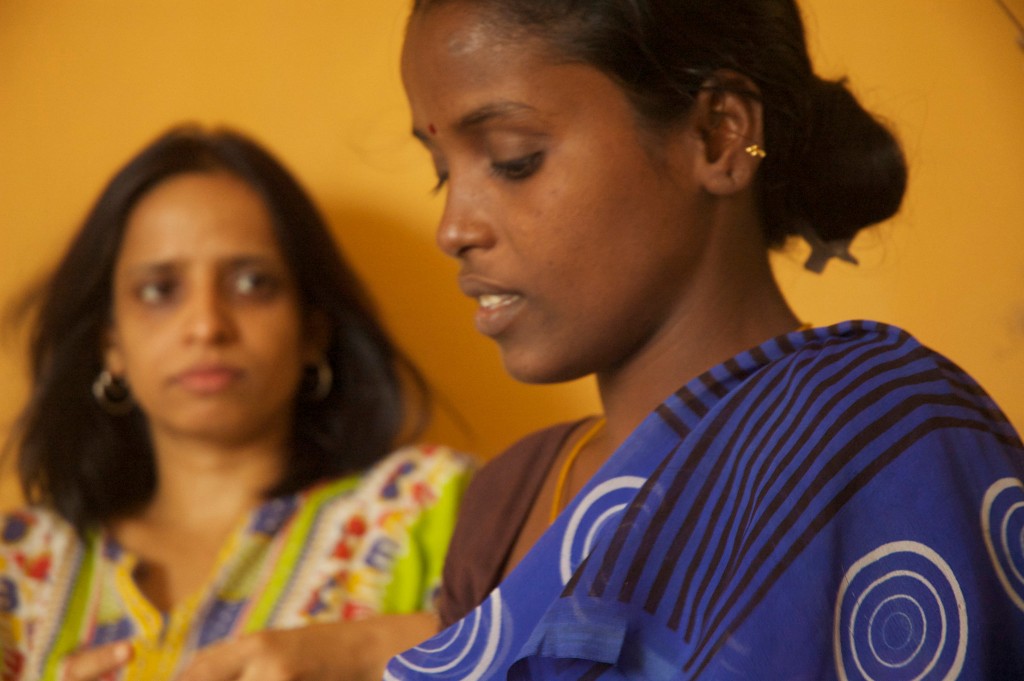
JAN. 28, 2014
A Maid’s Pay and Moral Choices
By ELLEN BARRY
NEW DELHI — A few years ago, the Indian filmmaker Nishtha Jain set up a camera in her apartment. She wanted to tell a story about a relationship between unequals.
Lakshmi, her 21-year-old housemaid, crawls across the floor with a rag, polishing the marble, while Ms. Jain, reading at a table, lifts up her feet and sets them down without a glance. Lakshmi prepares two cups of tea and gives one to Ms. Jain, who is seated in a chair, then, though a second chair is empty, sits on the floor to drink her own. Asked to join Ms. Jain and her friends at a lunch table, Lakshmi dissolves into helpless giggles. “See, they are sitting together like white people,” she tells her sister later. “And I am one black person amongst them.”
When Ms. Jain reviewed the footage for her 2008 documentary, “Lakshmi and Me,” a few scenes made her cringe — which was, in a way, the whole point of the project, which she described as “morally exhausting.” The disparity between middle-class Indians and their household staff is a subject no one is eager to talk about, even in the tidal wave of commentary over the case of Devyani Khobragade, the Indian diplomat who was charged with visa fraud in New York in relation to her treatment of her maid.
A superabundance of cheap labor is built into every aspect of life here. Domestic workers are at the bottom of the work force, wage-wise and class-wise, and in 2010 they earned a national average of about $1.30 a day.
Hunt for an apartment in New Delhi’s wealthy neighborhoods and this immediately becomes clear: Spacious homes feature tiny, airless spaces known as “servants’ quarters.” Elevators are sometimes marked with signs reading “Not for use by servants.” Landlords asked about installing dishwashers often respond with blank stares, because servants wash the dishes.
It is difficult to find anyone here who does not take advantage of low wages, including liberals and foreigners. I pay our nanny a salary of around $240 a month, and provide free lodging — twice the legal minimum wage for unskilled labor in Delhi, which is home to millions of poor people seeking work. One American friend, giving me advice before I moved, said the right thing to do was to employ as many people as possible. But even trying to make fair choices in this environment is morally exhausting.
Ms. Jain’s film is an attempt to grapple with that disparity — not just inIndia, she said in an interview, but anywhere, including the West, where poor women and migrants look after the children of the rich. When she began filming, Ms. Jain was paying Lakshmi 600 rupees, or about $9.50, per month for 45-minute daily cleanings, “less than what I would spend on a fancy dinner,” she reasons in a voiceover, “but that’s what everyone pays.”
No one abuses Lakshmi, a birdlike beauty who began working at the age of 10 collecting garbage in Mumbai, but the footage is difficult to watch at times anyway. The camera lingers on one of her middle-class employers, a well-meaning, educated woman who sits on a couch playing computer solitaire while Lakshmi — heavily pregnant and with a diagnosis of tuberculosis — passes back and forth doing household chores.
“We really look like jerks,” Ms. Jain said. “This film was a damn bold and really tiring thing to do, because we look like creeps, and this is what we are. We cannot wash our hands of this. We are accepting a certain inequity.”
It is not uncommon to hear discomfort of this kind here, but legislative solutions seem remote. A National Policy on Domestic Workers, which would extend minimum wage laws to protect workers in this sector, has been foundering in Parliament since 2011.
As for Lakshmi, the documentary gave her a sort of neighborhood celebrity. On her husband’s insistence, she withdrew the money from two funds the filmmaker set aside — one for her, and another for her daughter’s education — to buy land in South India, where she has given birth to two more daughters, each time hoping for the boy her husband wants, Ms. Jain said. When the two women last spoke, she was full of regret, and spoke of returning to Mumbai.
“She was very unhappy,” Ms. Jain said. But then she was gone again, leaving no phone number behind.
>via: http://www.nytimes.com/2014/01/29/world/asia/a-maids-pay-and-choices-of-morality.html?_r=2

